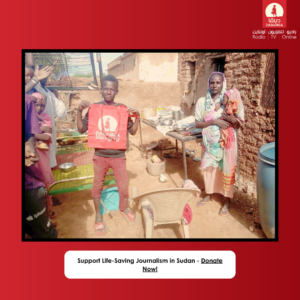African journalists decry new Sudan press seizures
The African Journalists’ Forum has condemned the repeated confiscation of newspapers by the Sudanese security apparatus in retaliation for coverage of the bread, fuel, and transportation crisis.
 A newspaper kiosk in Khartoum (File photo: SUNA)
A newspaper kiosk in Khartoum (File photo: SUNA)
The African Journalists’ Forum has condemned the repeated confiscation of newspapers by the Sudanese security apparatus in retaliation for coverage of the bread, fuel, and transportation crisis.
Yesterday the forum denounced in a statement the confiscation of El Jareeda newspaper for the third day in a row. It considered the move as an attempt to intimidate the media and deprive citizens of the right to information.
The forum called on the Sudanese government to stop immediately the arbitrary confiscation of newspapers and intimidation of journalists.
The statement criticised the new Sudanese Press Act, calling on the African Union to exert pressure on Sudan and other African countries to repeal the laws restricting freedom of information.
Delays
For the second day in a row, agents of the National Intelligence and Security Service (NISS) affected the print runs of El Jareeda andEl Sayha newspapers with a new tactic to delay newspaper distributions.
El Jareeda was not allowed to appear in Sudan on Monday morning, similar to the confiscation of the newspaper on Sunday morning. The NISS agents have given no explanation to the editors of the newspapers.
The crisis of bread, flour, fuel and cooking gas has continued in the capital and the states with the emergence of increasing in the queues of vehicles in front of fuel stations and people in front of bakeries in Khartoum and the states
Prices of construction materials have surged unexpectedly in the Sudanese markets, coinciding with a worsening of fuel supply crisis and power outages.
Cement prices have risen by more than 20 pe rcent; while the price of a ton of cement has risen to SDG 7,600 *$270) after the price was SDG 5,100 ($180) last week.
The operations of the flour mills operating in Khartoum state amounting to 42 mills have seen a severe crisis in covering the needs of flour of the state amounting to 45 sacks daily.
The crisis happened as a result of the power outages of the mills dropping down to 60 per cent of their capacity
The newspaper representatives covering the activities of the parliament decided to boycott the sessions of the National Assembly for two days, in protest against the administration of the National Assembly’s continued denying journalist Hiba Obeid access to the assembly.
The newspapers’ representatives of the parliament stressed in a statement “This ban clearly confirms that the parliament’s administration is working to restrict journalists to prevent publication of what is going on to public opinion”.
The statement said the ban is contrary to the constitution and the regulations of the parliament.
The journalists confirmed that they would follow the move with a protest memorandum to the speaker of parliament and another similar to the head of the Union of Sudanese Journalists.











 and then
and then